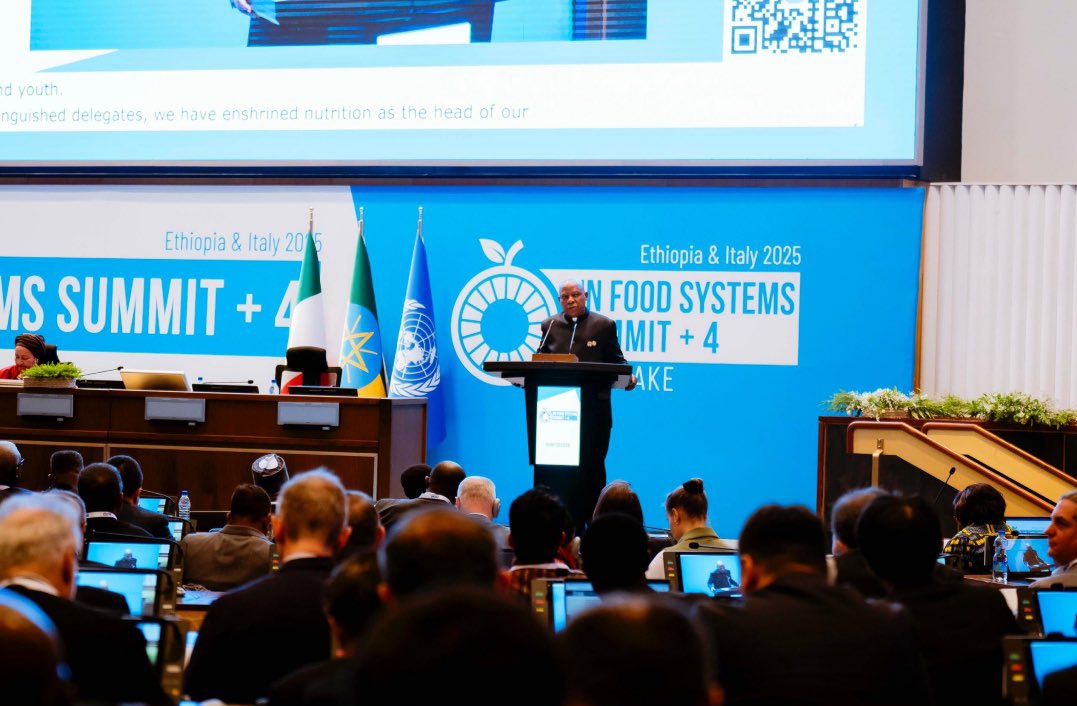UN Food Systems Summit Stocktake (UNFSS+4)
Nigeria advocates collective global action against food insecurity
Summary
- Nigeria, alongside other African nations and the United Nations, has called for unified global action to combat escalating food insecurity
- Vice President Senator Kashim Shettima, representing Nigeria at the UN Food Systems Summit Stocktake (UNFSS+4) in Addis Ababa, announced Nigeria’s deployment of modern technology, including AI, geospatial analytics, and satellite-driven climate intelligence, to bolster agricultural production
- African leaders emphasized the critical need for predictable concession finance to invest in agriculture, rural transformation, and infrastructure, stressing that climate finance must align with food system initiatives
- Nigeria’s recent declaration of a national emergency on food security and the advancement of the Presidential Initiative on Food Security underscore its commitment to upscaling vital staples and fostering inclusive agricultural growth
Addis Ababa, Ethiopia – Nigeria has emerged as a strong voice for collective global action against food insecurity, with Vice President Senator Kashim Shettima detailing the nation’s strategic pivot towards modern technology to enhance agricultural output.
Speaking at the opening session of the United Nations Food Systems Summit Stocktake (UNFSS+4) in Addis Ababa on Monday, 28th July 2025, Senator Shettima joined other African leaders and the United Nations in a unified call for shared purpose and determination to combat food insecurity both on the continent and globally.
The Vice President highlighted Nigeria’s proactive measures, stating, “Artificial intelligence, geospatial analytics, and satellite-driven climate intelligence are now part of our agricultural vocabulary. We are deploying these tools to monitor production, enhance transparency, connect producers to markets, and reduce waste across the value chain.”
This technological shift is part of Nigeria’s broader goal to ensure “a future that is anchored in abundance, equity, and human dignity.” Senator Shettima emphasized that food insecurity is a shared global affliction, urging African nations to “swim against the tide” amid climate change and other global challenges. He underscored the urgency for collective purpose, asserting that “a broken food system in any part of the world diminishes the dignity of humanity as a whole.”
“Let us build a world where no child sleeps on an empty stomach, where no farmer is forgotten, and where food is not a luxury but a human right.” He counselled.
Beyond technological advancements, the Nigerian Vice President outlined robust institutional reforms, including deepening partnerships across sectors and prioritizing agro-industrialization as a key driver of inclusive growth. This aligns with the unveiling of Nigeria’s National Food Systems Transformation Pathway, which has led to targeted investments in infrastructure and human capacity.
The declaration of a national emergency on food security in Nigeria, according to VP Shettima, is more than just raising an alarm. “It’s the reason we are advancing the Presidential Initiative on Food Security, a mission designed to upscale the cultivation of vital staples—maize, rice, cassava, and wheat,” he stated. This initiative is being supported by “climate-smart innovations, financial inclusion for smallholder farmers, and an expansion of extension services, particularly for women and youth.”
Further investments in agriculture include the establishment of Special Agro-Industrial Processing Zones, developed in partnership with the African Development Bank and IFAD. These zones are envisioned not merely as production sites but as “engines of transformation,” poised to create jobs, attract private capital, and link rural producers to national and global markets.
Senator Shettima extended President Bola Ahmed Tinubu’s gratitude to the host countries, Ethiopia and Italy, asserting Nigeria’s readiness to “listen, to learn, and to lead wherever leadership is required.” He affirmed Nigeria’s commitment to championing resilient food systems that are “responsive to nutritional needs, and rooted in local realities,” highlighting a belief that “the arc of history does not only bend towards justice. It bends towards food justice.”
Echoing Nigeria’s sentiments, the Prime Minister of Ethiopia, Dr. Abiy Ahmed, described the summit as a crucial moment for renewed commitment to building resilient and inclusive food systems.
Ahmed underscored Africa’s need for predictable concession finance for investments in agriculture, rural transformation, infrastructure, and literacy, emphasizing the vital alignment of climate finance with food systems due to the deep connection between hunger and environmental degradation. He also noted Ethiopia’s comprehensive roadmap for food system transformation launched since the first food system summit in 2021.
The global food system, Ahmed pointed out, faces immense pressure from various shocks, conflicts, inequalities, and economic destruction, further compounded by a decline in development assistance and multilateral cooperation, which threatens production, supply, and human dignity across nations.
The urgent calls from Nigeria and other African leaders at the UNFSS+4 underscore a collective determination to overcome these challenges through coordinated global efforts.







